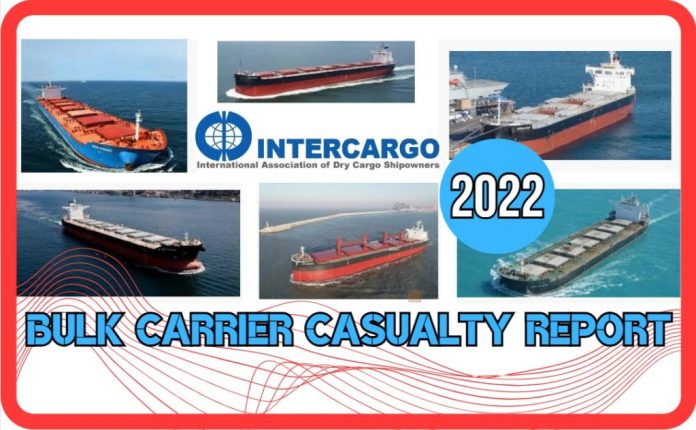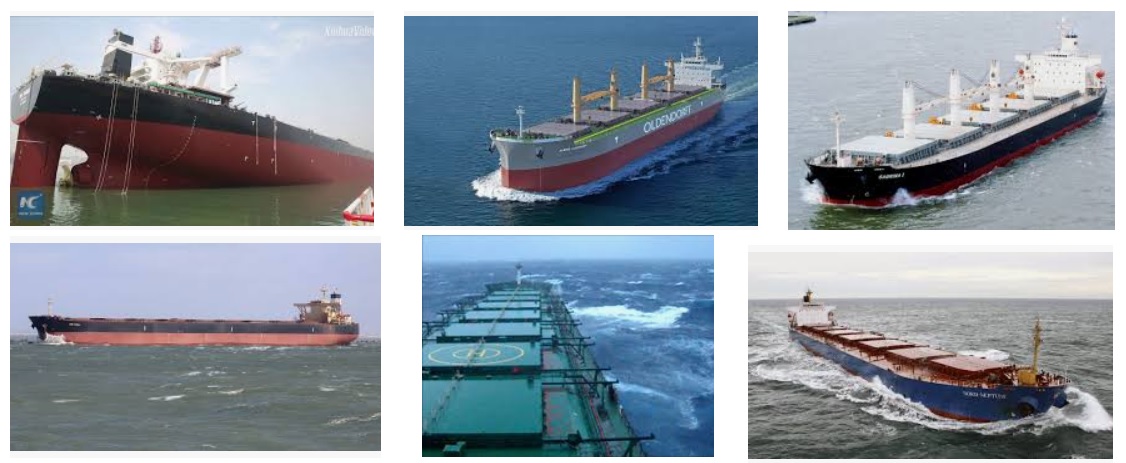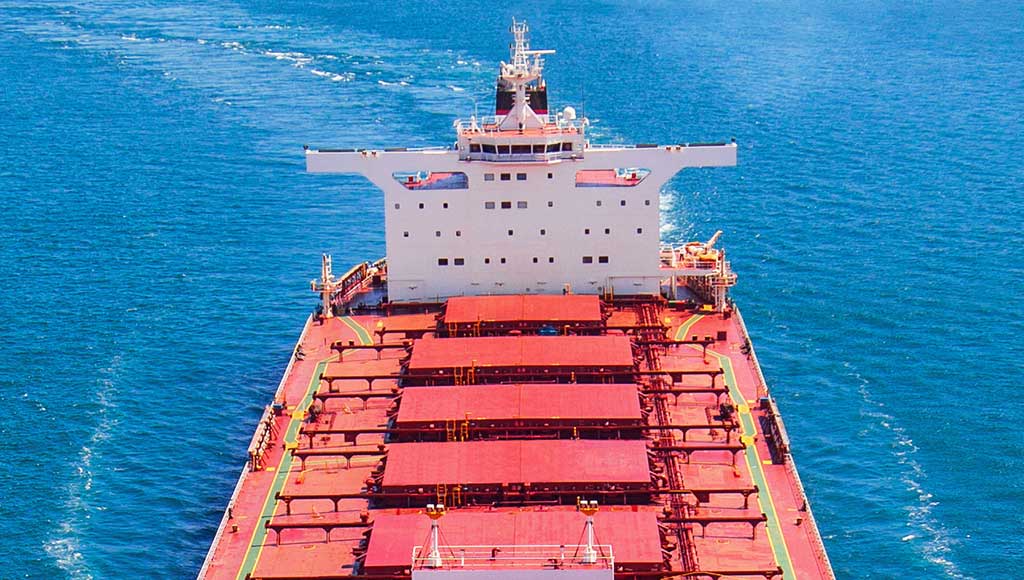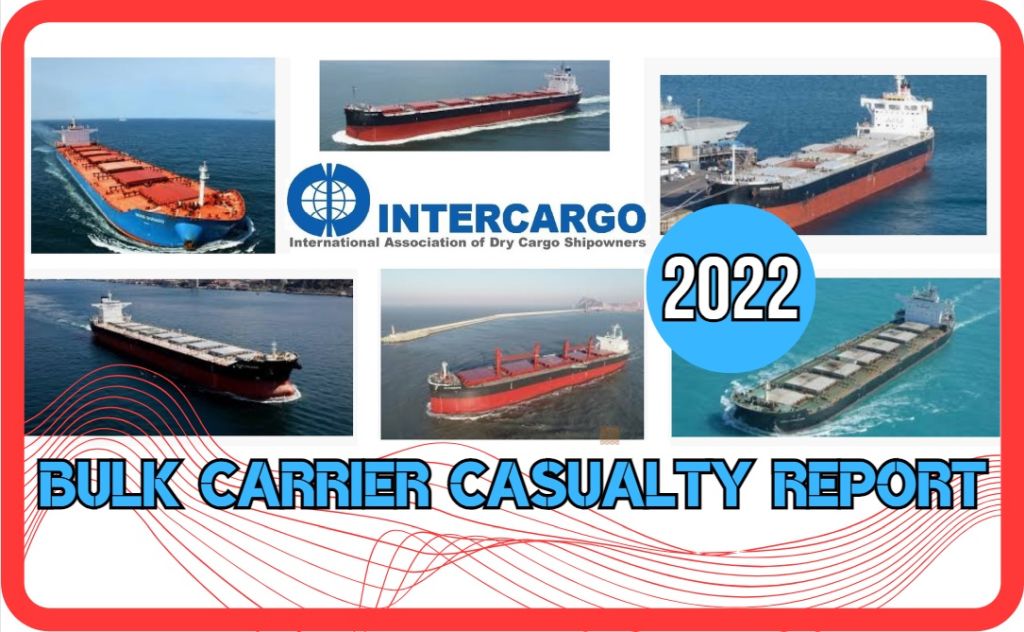
(www.MaritimeCyprus.com) Cargo liquefaction still remains the greatest contributor to loss of life associated with bulk carrier losses while grounding remains the main cause of ship losses, according to the recently published Bulk Carrier Casualty Report 2013-2022 from INTERCARGO.
The document was submitted to the International Maritime Organization in May, ahead of the 9th session of its Sub-Committee on Implementation of IMO Instruments (III), which takes place at the IMO from 31st July to 4th August and has a key role in casualty analysis and issuing lessons learned from marine incidents.
The Casualty Report provides 10-year information on bulk carrier casualty statistics, looking at trends in casualties in terms of both loss of life and loss of ships, drilling down into the size and age of vessels as well as Flag State performance.
While the report shows a clear trend of improved safety and declining ship losses at a time of fleet growth, it also shows that major incidents involving loss of life are still occurring and the industry must examine why they are still happening – there is no room for complacency.
Operations Manager Xianyong (Joe) Zhou, says: “As the voice of global dry bulk shipping, INTERCARGO is determined to help lead the response to these events. While the Report highlights that improvements are being made in safety, there is still clearly more to do to make shipping safer. We must continue to learn how we can best protect the lives of seafarers as well as the vessels and their cargo from damage and loss.”
The report highlights that between 2013 and 2022, 26 bulk carriers of more than 10,000 deadweight tonnes (dwt) were reported lost, with the tragic loss of 104 seafarers’ lives.
Statistics for 2022 alone show the loss of two bulk carriers, one due to a collision and the other from losing power and sinking in rough seas, with a loss of 12 seafarers from these incidents.
Cargo Liquefaction remains the greatest contributor to loss of life and concern of the Bulk carrier industry.
The rolling report also highlights that four of the five bulk carrier casualties, which led to the loss of 70 lives, occurred as a result of cargo liquefaction; four were loaded with nickel ore and one with bauxite.
In terms of ship losses, grounding was the most common reported cause between 2013 and 2022, accounting for 12 bulk carriers lost (46.2%), with various other causes including problems with machinery and equipment.
Learning lessons from incidents and casualties and the sharing of experience have proven to be effective in raising safety awareness and, in addition to the submission of the INTERCARGO Bulk Carrier Casualty Report to IMO every year since 1996, the association has made its voice heard on a number of safety issues at IMO through papers and interventions.

Significant findings:
An analysis of these incidents highlights cargo liquefaction and groundings as the major causes. Cargo liquefaction remains the greatest contributor to loss of life, while groundings remain the greatest cause of ship losses.
Liquefaction:
Four of the five bulk carrier casualties which occurred as a result of cargo liquefaction were loaded with nickel ore and one with bauxite.
They led to the loss of 70 seafarers’ lives (63.7% of the overall total) and accounted for 19.2% of all the vessel casualties over this time period. Liquefaction can occur either slowly over time or instantaneously and without warning. When cargo properties do not align with the shipper's documentation provided to the vessel, the risk of cargo failure can greatly increase.
Amendments 06-21 of the International Maritime Solid Bulk Cargoes (IMSBC) Code were developed in order to provide more accurate cargo information and will come into force on December 1, 2023.
The amendments include the term ‘dynamic separation’ in addition to liquefaction. This is expected to safeguard against moisture-related cargo failure mechanisms, which can cause cargo and ultimately vessel instability.
Group A cargoes, described under the amended IMSBC Code, can be hazardous due to excessive moisture. This may result in liquefaction or dynamic separation, if the moisture content is in excess of their transportable moisture limit (TML).
Grounding:
Grounding was the most commonly reported cause of ship losses between 2013 and 2022, accounting for 12 bulk carriers lost (46.2%).
Reports, where available, indicate that there were various causes for these casualties. Other incidents include complications with onboard machinery and equipment as possible causes.
An investigation into the grounding of John 1 off Newfoundland in 2014, found that a severe leak in the vessel was caused by a failure of the lower sea chest suction valve resulting in engine room flooding.
The Rio Gold incident in 2013 showed that a decision to stop en route in order to allow engineers to repair suspected main engine problems may have triggered the sequence of actions leading to its grounding.
The industry awaits the investigation of the loss of the Xing Shun No. 1 which sank in rough seas off Taiwan in 2022 as a result of losing power.

Safety performance of bulk carriers:
The bulk carrier industry has seen a welcome long-term positive safety trend in recent years. Ship loss statistics between 2013 and 2022 are highlighted in the ‘Safety performance of bulk carriers’ section in this report.
They suggest a clear improvement in terms of the number of annual losses of bulk carriers versus the total number of bulk carriers in the global fleet. The rolling ten-year trend also illustrates positive signs of safety improvement. This positive safety trend can be compared with industry figures which highlight continued growth of the global bulk carrier fleet in the years since 2013. However, we must remain vigilant and alert and constantly seek to improve cargo safety and safe navigation, to avoid cargo liquefaction and ship grounding.
To learn more, click below to download the full report:
Source: Intercargo
For more Marine Accident Investigation Reports, click HERE.















